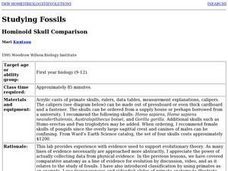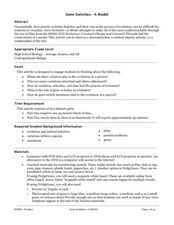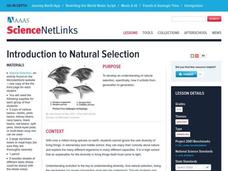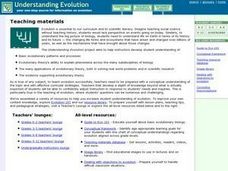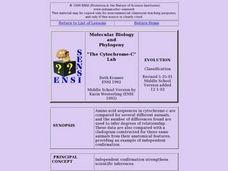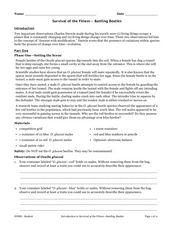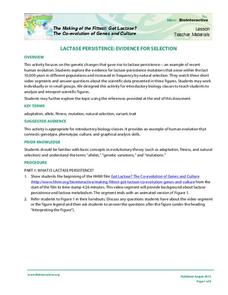Curated OER
Physiological Adaptations
Students investigate the concepts of genetics and how it is tied to the variations found within different species and how it is tied to adaptations. They review the theory of evolution and factors found to help create variation. The...
Curated OER
Becoming Whales: Experiencing Discoveries of
Students experience, through a "dig," the historical discovery of fossils which increasingly link whales to earlier land-dwelling mammals. They encounter the intermediate forms which show changes that lead to the modern whale.
Curated OER
Studying Fossils: Hominoid Skull Comparison
Students collect data on the differences in Hominid skulls using acrylic casts of fossil skulls. They measure a series of structures on skulls from six different species then use the data to determine evolutionary relationships between...
Curated OER
Natural Selection.... a Cumulative Process... it's in the cards!
Learners working in pairs attempt to produce a full sequence of 13 cards of one suit (ace - to king). This must be done by shuffling the suit of cards for each round, then checking the cards.
Curated OER
Survival of the Fittest – Battling Beetles
Students explore natural selection. For this genetic adaptation lesson plan, students discover why certain traits continue and some traits disappear. Students discover how species evolve and change. Resources are provided.
Curated OER
Gene Switches- A Model
Students explore genetic variation within a population. In this genetic adaptation lesson, students investigate the reasons contributing to genetic adaptation. Students collaborate and analyze DNA models. Multiple resources are provided.
Curated OER
Clipbirds
Students attempt to pick up various objects with a wide variety of beaks, including scissors, spoons, etc.
Curated OER
Introduction to Natural Selection
Students develop an understanding of natural selection, specifically, how it unfolds from generation to generation. They work in small groups to perform an experiment using beans. They use a worksheet imbedded in this plan to guide their...
Curated OER
Making Cladograms
Students construct cladograms (evolutionary trees), showing how shared derived characters can be used to reveal degrees of relationship. They interpret and analyze cladograms, and determine where unclassified vertebrates would fit on a...
Curated OER
The Great Fossil Find - Reconstructing the Pieces
Students go on an imaginary fossil hunt. They follow a script read by the teacher, students "find" (remove from envelope) paper "fossils" of some unknown creature. They attempt to reconstruct fossil pieces into an animal.
Curated OER
The Natural Selection of Bean Hunters
Students, in groups, hunt for beans placed in the lawn. Each group uses a different tool (hand, spoon, fork, etc.) and there are three different colors of beens.
Curated OER
The Chips Are Down: A Natural Selection Simulation
Students, in teams, use different colored paper chips to represent prey and a piece of fabric as the environment.
Curated OER
Investigating Evolutionary Questions: Bats, Whales, Reptiles, Birds, Animal Classification
Students are guided through a process in which three questions are addressed by retrieving beta hemoglobin sequences from online databases, and using online tools to compare those sequences in student-selected animals.
Curated OER
Examining the Fossil Record
Young scholars create an evolutionary tree based on fossil morphology and their ages. In this fossil record lesson plan, students are given 23 pictures of fossil. They study their morphology and arrange the fossils by age and structures...
Curated OER
Scavenger Hunt: A Group Collection
Learners be complete a collection of living organisms and systems from the school campus.
Curated OER
VARVES: Dating Sedimentary Strata: Geology, Paleontological Patterns
Young scholars count the number of varves (annual layers of sediment) in shale billets, taken from the Green River Formation in Wyoming. The count is then extended to reflect the entire 260 meters of sediments where the billets originated.
Curated OER
The Cytochrome-C Lab
Learners examine a method biologists use to try to determine relationships. They examine how amino acid sequences have been determined for a number of proteins, and how scientists can make inferences about DNA based on the amino acid...
Curated OER
Why Do People Fall in Love?
Students discuss human behavior, sexual selection and the underlying genetic and evolutionary reasons for mate selection. The, in groups, they rate the attractiveness of certain individuals and measure facial features for symmetry.
Curated OER
Early Earth History
In this earth history worksheet, students answer 12 questions about geological time, the eras of Earth, the changes taking place in early Earth and the life present during the eras. They also answer 2 questions about the Paleozoic Era.
Curated OER
Survival of the Fittest -- Battling Beetles
Students experiment with traits. In this Science lesson plan, students test the strength of beetles using M&M candies in lieu of the insects. Students use the Hardy-Weinberg Equation to calculate possible offspring traits of further...
Curated OER
INSECT TAXONOMY VIA THE INTERNET
Seventh graders explore how to classify insects and organize information.In this insect classification lesson students use the Internet to retrieve information on insects then organize the pictures to make a book project.
Howard Hughes Medical Institute
Lactase Persistence: Evidence for Selection
What's the link between lactase persistence and dairy farming? Biology scholars analyze data to find evidence of the connection, then relate this to human adaptation. Working individually and in small groups, learners view short video...
Howard Hughes Medical Institute
Using DNA to Explore Lizard Phylogeny
On the Caribbean islands, lizards expanded into different niches instead of competing for resources. Scholars discuss and learn from experts in a video how scientists prove the theory. They build phylogenetic trees based on appearances...
Curated OER
Science Puzzlers, Twisters, and Teasers: The History of Life on Earth
A somewhat amusing assignment, this activity lists statements that an ancient organism may have made and asks learners to determine what geologic era that each may have lived in. It uses witty word puzzles and fill-in-the-blank-style...




